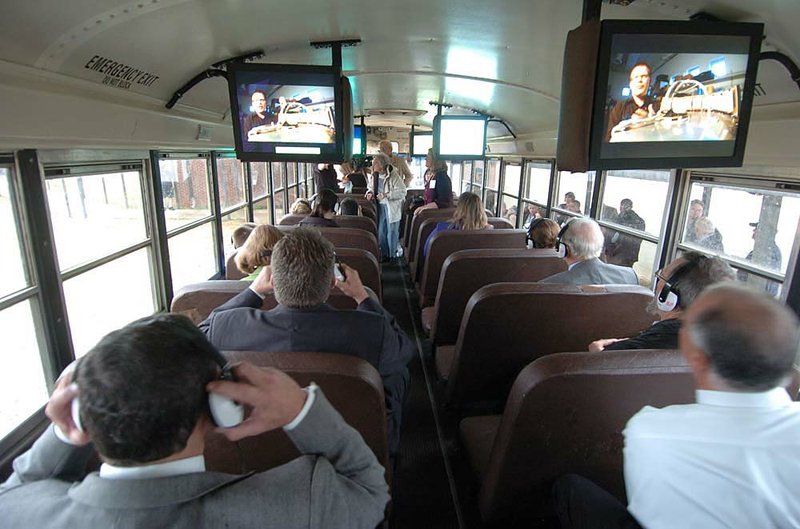HECTOR — While the wheels on this yellow school bus go round and round, the students on the bus can watch the Discovery Channel’s Myth Busters and other math and science programming on five, customized ceiling mounted computers.
Riding the outfitted bus to and from school in this rural Pope County community can mean as much as two hours a day of extra math and science for 50 students in kindergarten through 12th grade.
The state-of-the-art bus is the latest innovation from Vanderbilt University’s Aspirnaut Program, which was founded in 2006 by Vanderbilt scientist and Arkansas native Billy Hudson and his family members to better prepare rural Arkansas and Maine students for careers in math, science and technology.
Dr. Julie Hudson, who is Billy Hudson’s wife and assistant vice chancellor of health affairs at Vanderbilt University Medial Center, said Monday that the 615-student Hector School District’s outfitted bus shows that there are ways that schools - with financial help from the community - can extend student learning time.
“When you look at educational systems around the world that are outscoring or outperforming the United States, they are spending more time learning,” Julie Hudson said. “This is one simple thing we can do to help close that gap ... in hopefully a fun way and at a time when the students can’t do much else. They are a captive audience.”
The five LCD computer screens are strategically placed in the bus, and different programming is downloaded to each one to accommodate the different ages and grade levels of the viewers.
The kindergarten-through second graders sit at the front of the bus and watch age-appropriate material. Third through-fifth graders watch different lessons on another screen just as sixth-through eighth graders - sitting in the middle of the 2005 bus - see lessons that reinforce what they are learning in the traditional classroom.
Two computer screens near the back of the bus that broadcast material from Discovery Education, PBS, CBS News, NASA or the Smithsonian Institute, compete with cell phones and MP3 players for the attention of high school-aged bus riders.
Coupled with the computers on the bus is a Global Positioning System that detects when a student equipped with a special plastic card enters and exits the bus, where that child sits on the bus, and whether the child alters his normal drop off and pick up locations. The information is downloaded and recorded in the district’s computer system and will be used over time to help evaluate the computerized programming.
The “Mediascreen School Bus” has been in operation for the past month.
During a student demonstration of the system on Monday, Kaitlinn Bailey, 14, an eighth-grader who hopes to become a pediatrician or a cardiologist, watched a video on microscopes and cells.
“I like the computers being on the bus because I have a long bus ride home and our bus used to be really loud. It keeps everybody calm,” said Kaitlinn, whose one-way ride to or from school is about 45 minutes.
“Most of us listen. We listen to it and talk about it. Everybody at school asks us about it.‘What did you all watch on the bus?’ My parents ask me what I watched on the bus when I get home.”
As for how the bus lessons, such as Monday’s video on cells, apply in the classroom, Kaitlinn said the broadcast lessons reinforce what students learned earlier in class and frequently go into more detail.
The Hector bus was customized by Diamond State Bus Company in Conway at a cost of about $20,000, Julie Hudson said.
That included padding the monitors to protect the equipment and to prevent injury to students. Headphones, which are stored in pockets next to each bus seat, and headphone jacks had to be installed. Headphone volume had to be controlled to avoid injury to student hearing. The computers had to be fan-less so that dirt and grime aren’t pulled into the systems.
The systems also had to be protected from shocks, vibrations, cold and humidity. The screens had to be made visible in daylight. And the system couldn’t be a huge drain on the bus engine battery.
While students are not yet interacting with the computers with keyboards, the computers are able to connect to the Internet through the Hector School District’s wireless local area network.
The Aspirnaut staff at Vanderbilt, which is in Nashville, Tenn., works with Hector Superintendent Karen Cushman to ensure that the lessons shown on the bus are age appropriate and mesh with Arkansas’ education standards.
The Aspirnaut program initially equipped two buses in the Sheridan School District with internet access so that high school students could take Advanced Placement courses on their long bus rides to and from school from Billy Hudson’s home community of Grapevine in Grant County.
That three-year program has ended, although three students are continuing to take online courses, Billy Hudson said Monday.
Hector, a town of 500, was selected for the customized bus by the Aspirnaut Program, a 501-c-3 nonprofit organization, in cooperation with the Arkansas Public School Resource Center, which is an arm of the University of Central Arkansas.
The Hector district has aggressively pushed ahead with technology, equipping each of its pupils in third through sixth grades and about half of its high school students with computer Netbooks or iPads.
The Aspirnaut Program is currently working with the Poyen School District and the KIPP Delta Public Charter School in Helena-West Helena by providing weekly science lessons from Vanderbilt to the students via videoconferencing. Students also are invited to Vanderbilt for summer science programs.
The Aspirnaut Program is seeking an $8 million National Science Foundation grant to expand all of its initiatives to 10 Arkansas school districts and five districts in Maine.
Arkansas, Pages 9 on 11/30/2010
